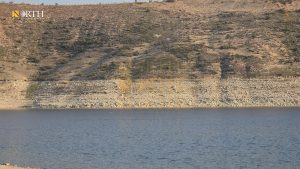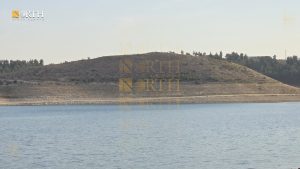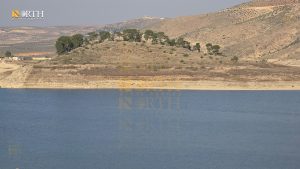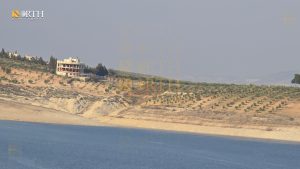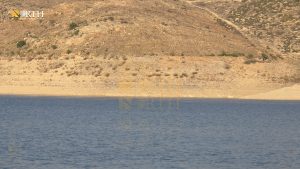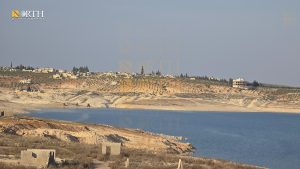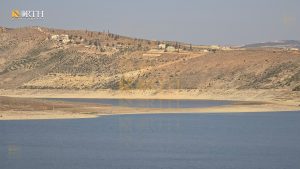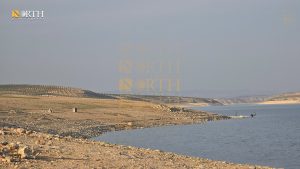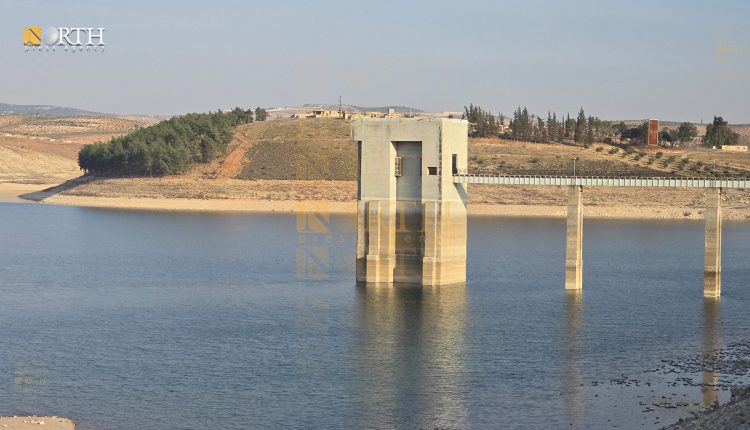
By Siwar Hamo
AFRIN, Syria (North Press) – In the aftermath of the devastating 2023 earthquake that struck northwestern Syria and Turkey, the Turkish governor ordered the local council in Afrin to release half of the stored water from Maydanki Lake, citing concerns about potential damage to the dam.
This decision, combined with Turkey’s construction of upstream dams, declining rainfall over the years, and consecutive droughts, has significantly depleted the lake’s water reserves, according to local residents and human rights organizations.
Water diversion and its impact
Since 2012, the tributaries of the Afrin River, originating in Turkey, have gradually decreased in flow following the Turkish government’s construction of a dam within its borders. As a result, the water levels in Maydanki Lake steadily declined until the river’s tributaries were completely diverted to supply the newly built dam in Kilis, Turkey.
In 2021, the Afrin Activists Network, a local network that monitors violations in Afrin, released images showing Turkey’s construction of another dam on the Afrin River near Maydanki Lake in Sharran district. The group accused Turkey of diverting Afrin’s water supply by building infrastructure on the river’s Turkish side.
On June 11, 2021, Turkish President Recep Tayyip Erdoğan inaugurated the “Upper Afrin Dam” in Kilis via video conference. At the time, Turkey’s Ministry of Agriculture and Forestry stated that the dam, with a storage capacity of 38 million cubic meters, was intended to meet the drinking water and public utility needs of Kilis province.
By 2023, Turkey had opened the drainage gates of the Maydanki Dam to transfer water to the Reyhanlı Dam in southern Turkey, near Idlib. This action drastically reduced water levels in both Maydanki Lake and the Afrin River, raising serious concerns among farmers and residents about an impending environmental disaster.
One of the most affected areas is Jindires, where the Afrin River’s tributaries have completely dried up, particularly near the villages of Deir Ballout and al-Muhammadiyah, close to the Turkish border.
The Maydanki Dam was originally constructed in 1997 by the Syrian Ministry of Water Resources and officially opened in 2004. The dam was designed to store 64 million cubic meters of water, serving as the primary drinking water source for Afrin and Azaz.
Additionally, the ministry established irrigation channels to supply water to vast agricultural lands, olive groves, and fruit orchards across Afrin’s plains.
Agricultural devastation, economic struggles
The depletion of water reserves has severely impacted Afrin’s agricultural sector, which is the backbone of the local economy.
Hussein Alo, a 52-year-old farmer from Ster village in Maabatli district, describes the dire situation: “The low water levels in the dam have made it nearly impossible to irrigate crops in Afrin. This has led to massive losses for farmers and orchard owners, as irrigation water is no longer available through the canals. As a result, our livelihoods have been directly affected, and our standard of living has plummeted.”
Alo, who owns 4 hectares of farmland cultivated with wheat and vegetables, was forced to dig a well to sustain his crops. However, due to prolonged drought, the groundwater levels also dropped, rendering farming unsustainable. “Agriculture is no longer profitable enough to support my family,” he laments.
Kawa Omar, a 62-year-old farmer from Ain Dara village, shares a similar struggle: “I used to own a fruit orchard, but after the irrigation channels dried up, I had to cut down most of my trees. Now, I can only plant winter crops because there is no water for irrigation.” The loss of his orchard has left him in severe financial distress.
Ahmad Brimo, a 60-year-old farmer from Ghazawiyah village, describes how he and his brothers, who once managed three orchards and a vegetable farm, were forced to abandon their land. “Due to the lack of irrigation water, our trees dried up. We eventually had to uproot them and lease the land to others, as we could no longer sustain our losses.”
With agriculture being the primary source of income for Afrin’s residents, the water crisis has left many farmers unemployed. The accumulated financial losses have forced them to abandon their land, with no governmental support or compensation in sight.

